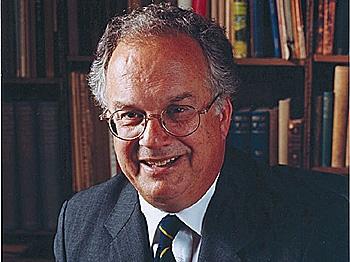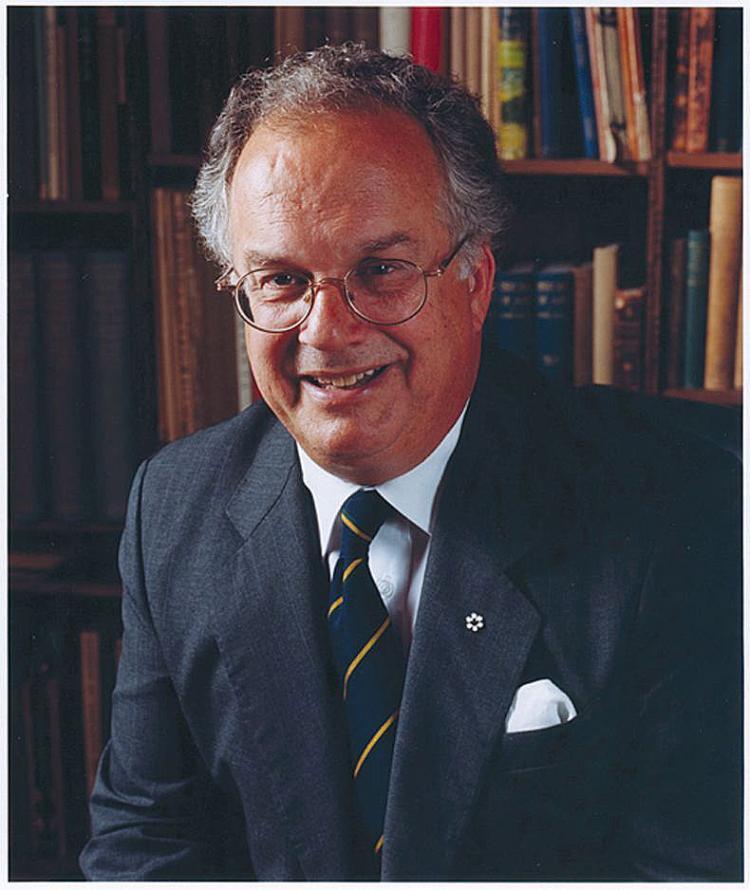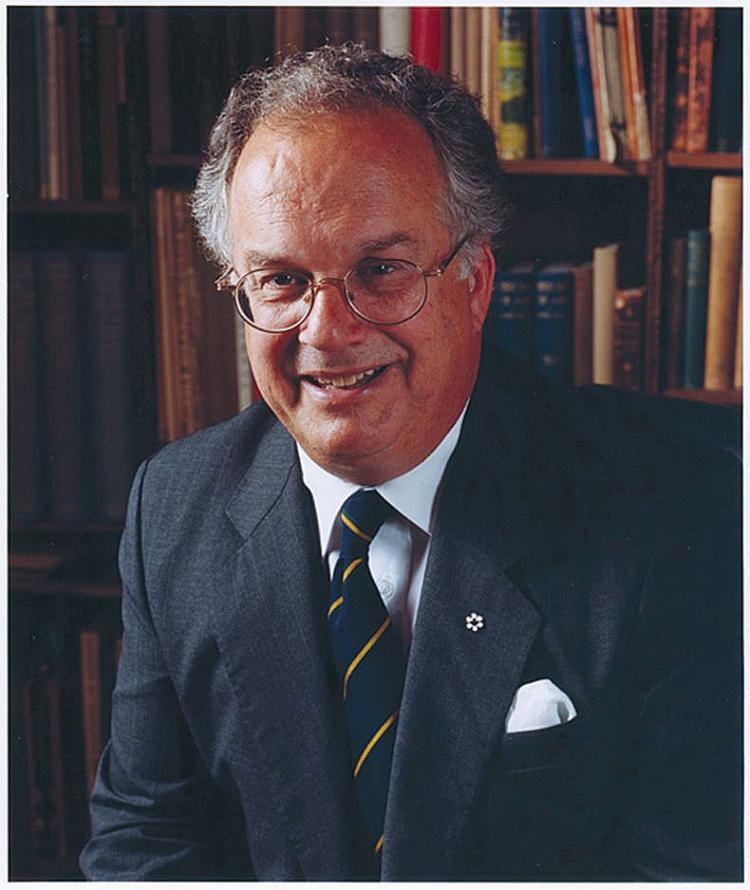The life of Fraser, an award-winning journalist and a member of Order of Canada, the highest civilian national award, has been filled with surprises and adventures—just the way he likes it to be.
“I thought I wanted to be a university professor, but I think I wanted a life with more action. So I didn’t do a doctorate. And I went to start working at newspapers,” said Fraser in an interview with New Tang Dynasty Television (NTDTV), a sister media of The Epoch Times.
He is the author of The Chinese: Portrait of a People (1981) and Private View: Inside Baryshnikov’s American Ballet Theatre (1992).
Since working as a copy boy in a news firm at age 16, he never left journalism and writing.
After getting his Master of Arts degree, he transitioned in less than half a year from a young journalist to a dance and theater critic of the Toronto Telegram, and later on of the Canadian national newspaper, The Globe and Mail, where he stayed for nearly two decades.
“I was arrogant and young. I thought I could do anything. So I applied for the job [at Toronto Telegram]. I knew very little about dance, but that came with the job,” said Fraser.
When he first met with Baryshnikov, Fraser managed to get Baryshnikov’s first interview and help him to connect with a few friends for his escape.
“I felt a bit like the James Bond of ballet,” said Fraser. “I was a middleman but decided not to stay in the middle and became his friend. And we are still good friends.”
Fraser loved working at The Globe and Mail for the “wonderful assignments” he received. During his years there, he went to Beijing (known as Peking at the time) and London.
Fraser arrived in Beijing, the capital of China, shortly after Chairman Mao Zedong died, and left before Mao’s wife, Jiang Qing, went on trial for her involvement in the Gang of Four; a group who was blamed for nearly everything done during Mao’s era.
The term of his assignment from 1977 to 1979 coincided with China’s “Tiny Democracy Movement,” during which the usual totalitarian brutality and controls were briefly alleviated by the authorities. Fraser was therefore able to capture aspects of China that were ordinarily concealed from Western correspondents.
“It was just a wonderfully hopeful time,” said Fraser.
At the time, The Globe and Mail was the only North American newspaper bureau in Beijing. Therefore, Fraser also wrote for The New York Times and The Washington Post.
In 1978, Robert Novak, senior journalist from The Washington Post, arrived in China to interview Deng Xiaoping, vice premier of China.
“And I said to him [Novak], You can’t just talk to leadership, and I took him down to the ‘Xidan Democracy Wall,’” said Fraser.
“Xidan Democracy Wall” was a long brick wall on Xidan Street in Beijing that existed between December 1978 and December 1979, which became the focus for democratic dissent. Commoners in Beijing pasted dazibao (big-character posters) onto the “Democracy Wall” to express messages of freedom and democracy.
When some of the hundreds of Chinese at the “Democracy Wall” asked the foreign reporters about their agenda, Fraser told them about Novak’s plan.
“And I said, Why don’t you give him some questions that he can ask the vice premier? —not knowing that I’d offered them the only opportunity to ever have to speak to their own leadership,” said Fraser.
Suddenly, a crowd of a hundred turned into about a thousand. Everyone wrote down the questions for Deng Xiaoping and handed them over to the foreign journalists.
When Fraser and his wife returned to Xidan [Street] after Novak’s interview, they found themselves surrounded by about 25,000 Chinese, waiting for Deng’s answers.
“All the foreign press were there. There were diplomatic observers,” said Fraser. “Next thing I knew they decided the crowd needed to see me. And they picked me up, physically, and put me on the shoulders of a PLA man, the People’s Liberation Army. So I was standing up piggy-backed. And they had three or four people who were translators.”
“And I would say something like, Deng Xiaoping says, and they say, ‘Deng Xiaoping shuo.’ So I said when he was asked of what he thought of the ‘Xidan Wall,’ he said it was good. So this went up, ‘Deng Xiaoping shuo, ‘Xidan hao!’ And the crowd erupted.”
“You would have thought it was May Day. And then I had to continue the quote, ‘But.’ ‘Keshi.’—suddenly, dead silence, because they knew better than I did that every word was important—but Deng Xiaoping said, ‘Some people were writing something that are wrong on the wall, are antiparty.’ So it was like, Xidan’s good, but watch it.”
When the gathering was over, Fraser was allowed down while his wife and other foreigners were sitting down on the ground.
When the crowd stretched forward, his wife was completely smothered.
“It could’ve been lethal, but the crowd was well-organized and someone said, ‘Xiaoxin, xiaoxin, waiguoren (Be careful, there are foreigners).’”
“My wife remembered that her face was completely smothered, and she thought she couldn’t move, couldn’t move an inch; because so many bodies were on top of her. She thought, ‘I was going to end.’ And suddenly she was lifted up. And her coat had footsteps all over it. She’d been walked on. So it was a very exciting night.”
When Fraser realized that he lost a family ring, he decided to ask his translator to paste a wall poster with his phone number and asking for its return if anyone saw it. Yet he did not realize he created a one-and-only chance for an ordinary Chinese person to freely talk to a foreigner.
Many Chinese phoned in to practice English or fulfill their curiosity. The phone never stopped ringing until Fraser found the ring in the bureau apartment office.
When he went to take another look at the poster, a little statement beside it grabbed his attention.
“One woman wrote this incredibly moving wall poster. It said:
‘Dear foreign friend from the land of Norman Bethune, you’ve lost your precious ring. I’m sorry and I hope someone finds it. And if it’s a true Chinese person, they won’t keep it, they’ll give it back to you.
But I’ve also something very precious—my son. He tried to stand up for democracy in the Cultural Revolution, and he was arrested and killed. He can never come back. So don’t worry about your ring too much. It’s just a piece of metal. Thank you for coming here. Thank you for being a journalist, but my loss is bigger than yours.’”
Upon going back to Canada, Fraser said that his China trip changed him dramatically.
“[I will] never forget how brutal the regime is and not go on the side of Wow, wow, wow; of course with such a large number of people, there’s going to be some errors. I will never, never make that mistake,” said Fraser.
“That’s how I am changed. I’ll never look at China as just being the mass of people. I always look at it as individual people that I know; very, very delineated in my mind—their hopes and ambitions, sorrows and betrayals—all of that.”
“We had a strong feeling that some of the work conditions were really bad for Chinese people. And some of the products that were starting to come on the market were made in reeducation centers and labor camps; so we thought we’ll just do our personal boycott of Chinese goods, so these things straightened out. Talk about naïve, we didn’t know that everything would eventually be made in China. So I probably got Chinese shoes on. Who knows? So we are compromised.”
“I thought I wanted to be a university professor, but I think I wanted a life with more action. So I didn’t do a doctorate. And I went to start working at newspapers,” said Fraser in an interview with New Tang Dynasty Television (NTDTV), a sister media of The Epoch Times.
He is the author of The Chinese: Portrait of a People (1981) and Private View: Inside Baryshnikov’s American Ballet Theatre (1992).
Since working as a copy boy in a news firm at age 16, he never left journalism and writing.
After getting his Master of Arts degree, he transitioned in less than half a year from a young journalist to a dance and theater critic of the Toronto Telegram, and later on of the Canadian national newspaper, The Globe and Mail, where he stayed for nearly two decades.
“I was arrogant and young. I thought I could do anything. So I applied for the job [at Toronto Telegram]. I knew very little about dance, but that came with the job,” said Fraser.
Saving Ballet Superstar
Fraser gained international attention in 1974 for helping Soviet ballet superstar Mikhail Baryshnikov defect to Canada while in Toronto during a performing tour.When he first met with Baryshnikov, Fraser managed to get Baryshnikov’s first interview and help him to connect with a few friends for his escape.
“I felt a bit like the James Bond of ballet,” said Fraser. “I was a middleman but decided not to stay in the middle and became his friend. And we are still good friends.”
Dance Critic to Foreign Correspondent
Fraser loved working at The Globe and Mail for the “wonderful assignments” he received. During his years there, he went to Beijing (known as Peking at the time) and London.
Fraser arrived in Beijing, the capital of China, shortly after Chairman Mao Zedong died, and left before Mao’s wife, Jiang Qing, went on trial for her involvement in the Gang of Four; a group who was blamed for nearly everything done during Mao’s era.
The term of his assignment from 1977 to 1979 coincided with China’s “Tiny Democracy Movement,” during which the usual totalitarian brutality and controls were briefly alleviated by the authorities. Fraser was therefore able to capture aspects of China that were ordinarily concealed from Western correspondents.
“It was just a wonderfully hopeful time,” said Fraser.
At the time, The Globe and Mail was the only North American newspaper bureau in Beijing. Therefore, Fraser also wrote for The New York Times and The Washington Post.
In 1978, Robert Novak, senior journalist from The Washington Post, arrived in China to interview Deng Xiaoping, vice premier of China.
“And I said to him [Novak], You can’t just talk to leadership, and I took him down to the ‘Xidan Democracy Wall,’” said Fraser.
“Xidan Democracy Wall” was a long brick wall on Xidan Street in Beijing that existed between December 1978 and December 1979, which became the focus for democratic dissent. Commoners in Beijing pasted dazibao (big-character posters) onto the “Democracy Wall” to express messages of freedom and democracy.
When some of the hundreds of Chinese at the “Democracy Wall” asked the foreign reporters about their agenda, Fraser told them about Novak’s plan.
“And I said, Why don’t you give him some questions that he can ask the vice premier? —not knowing that I’d offered them the only opportunity to ever have to speak to their own leadership,” said Fraser.
Suddenly, a crowd of a hundred turned into about a thousand. Everyone wrote down the questions for Deng Xiaoping and handed them over to the foreign journalists.
When Fraser and his wife returned to Xidan [Street] after Novak’s interview, they found themselves surrounded by about 25,000 Chinese, waiting for Deng’s answers.
“All the foreign press were there. There were diplomatic observers,” said Fraser. “Next thing I knew they decided the crowd needed to see me. And they picked me up, physically, and put me on the shoulders of a PLA man, the People’s Liberation Army. So I was standing up piggy-backed. And they had three or four people who were translators.”
“And I would say something like, Deng Xiaoping says, and they say, ‘Deng Xiaoping shuo.’ So I said when he was asked of what he thought of the ‘Xidan Wall,’ he said it was good. So this went up, ‘Deng Xiaoping shuo, ‘Xidan hao!’ And the crowd erupted.”
“You would have thought it was May Day. And then I had to continue the quote, ‘But.’ ‘Keshi.’—suddenly, dead silence, because they knew better than I did that every word was important—but Deng Xiaoping said, ‘Some people were writing something that are wrong on the wall, are antiparty.’ So it was like, Xidan’s good, but watch it.”
When the gathering was over, Fraser was allowed down while his wife and other foreigners were sitting down on the ground.
When the crowd stretched forward, his wife was completely smothered.
“It could’ve been lethal, but the crowd was well-organized and someone said, ‘Xiaoxin, xiaoxin, waiguoren (Be careful, there are foreigners).’”
“My wife remembered that her face was completely smothered, and she thought she couldn’t move, couldn’t move an inch; because so many bodies were on top of her. She thought, ‘I was going to end.’ And suddenly she was lifted up. And her coat had footsteps all over it. She’d been walked on. So it was a very exciting night.”
Lost Ring, Lost Life
When Fraser realized that he lost a family ring, he decided to ask his translator to paste a wall poster with his phone number and asking for its return if anyone saw it. Yet he did not realize he created a one-and-only chance for an ordinary Chinese person to freely talk to a foreigner.
Many Chinese phoned in to practice English or fulfill their curiosity. The phone never stopped ringing until Fraser found the ring in the bureau apartment office.
When he went to take another look at the poster, a little statement beside it grabbed his attention.
“One woman wrote this incredibly moving wall poster. It said:
‘Dear foreign friend from the land of Norman Bethune, you’ve lost your precious ring. I’m sorry and I hope someone finds it. And if it’s a true Chinese person, they won’t keep it, they’ll give it back to you.
But I’ve also something very precious—my son. He tried to stand up for democracy in the Cultural Revolution, and he was arrested and killed. He can never come back. So don’t worry about your ring too much. It’s just a piece of metal. Thank you for coming here. Thank you for being a journalist, but my loss is bigger than yours.’”
Upon going back to Canada, Fraser said that his China trip changed him dramatically.
“[I will] never forget how brutal the regime is and not go on the side of Wow, wow, wow; of course with such a large number of people, there’s going to be some errors. I will never, never make that mistake,” said Fraser.
“That’s how I am changed. I’ll never look at China as just being the mass of people. I always look at it as individual people that I know; very, very delineated in my mind—their hopes and ambitions, sorrows and betrayals—all of that.”
“We had a strong feeling that some of the work conditions were really bad for Chinese people. And some of the products that were starting to come on the market were made in reeducation centers and labor camps; so we thought we’ll just do our personal boycott of Chinese goods, so these things straightened out. Talk about naïve, we didn’t know that everything would eventually be made in China. So I probably got Chinese shoes on. Who knows? So we are compromised.”







